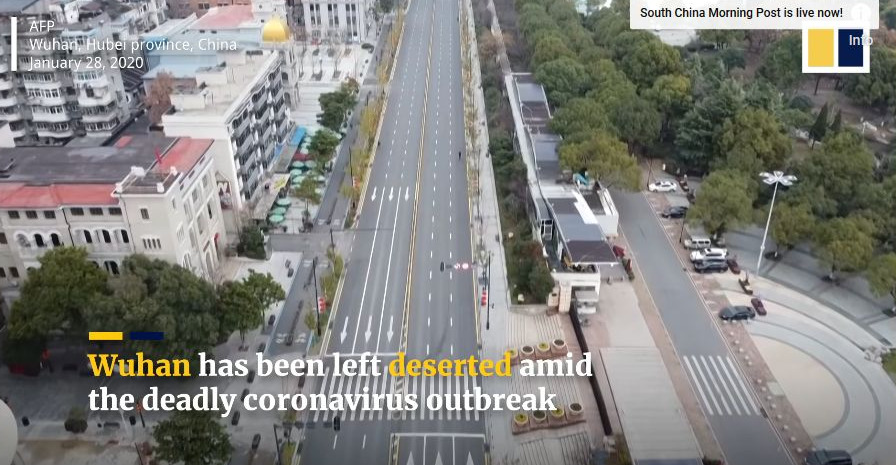
China’s Communist government became aware of the outbreak of coronavirus in Wuhan in early December and moved swiftly to contain it — not the spread of the virus but public disclosure of its threat.
Authorities sent police to arrest citizens who posted information on social media about the earliest infections and first deaths, accusing them of “spreading “rumors” and disrupting “social order.”
As the death toll climbs and the virus afflicts more than 20,000 people worldwide, all but about 300 of them in China, the Beijing leadership appears to have abandoned the knee-jerk policy of cover-up and begun addressing the catastrophic consequences of trying to make a secret of a national disaster.
Chinese President Xi Jinping warned Tuesday that unless the government halts the spread of the epidemic, its mishandling of the crisis could undermine confidence in the political system.
“The outbreak is a major test of China’s system and capacity for governance,” Xi said Tuesday, according to Chinese state media. He added that central authorities needed to “sum up the experience and draw a lesson from it.”
The party’s powerful Politburo Standing Committee vowed punishment of those responsible for the missteps that allowed the SARS-like virus to spread from Wuhan and Hubei Province to other areas of China and at least two dozen other countries.
Reality forced the Beijing leadership to abandon its traditional policy of “stability preservation first,” the imposition of secrecy on a problem that could reflect poorly on the government and undermine public confidence in the one-party system.
The about-face on the public’s right to know is reminiscent of the Soviet leadership’s disastrous handling of the 1986 Chernobyl nuclear catastrophe, when Moscow’s state-controlled media waited three days to report the accident and only after the radiation cloud circling the globe was detected in foreign countries.
The Chernobyl accident and the public’s outrage over it forced the Kremlin to live up to its proclaimed commitment to glasnost, Soviet leader Mikhail S. Gorbachev’s policy of encouraging openness to shed light on the country’s problems in order to correct them. The explosion and meltdown at the Ukrainian nuclear plant exposed the fallacy of promised honesty and candor, which led to empowerment of environmental activists and proponents of independent media. And those reforms fueled the emergence of opposition forces that spotlighted the risks to the public from the state’s monopoly control of information and the absence of checks on the Communist Party’s power. The Chernobyl cover-up was an important step on the road to the Soviet Union’s 1991 breakup.
A veteran journalist living in Wuhan, writing under the pen name Da Shiji for the independent China Media Project, reported in late January that authorities in the surrounding Hubei Province waited 40 days after becoming aware of the first infections before issuing quarantine orders on Wuhan, a city of 11 million people. When Wuhan authorities on Jan. 23 issued the order at 2 a.m. to lock down the metropolis, they waited another eight hours before closing off rail, road and bus traffic out of the city. The CMA report estimated that as many as a million people fled the impending lockdown during that hiatus, allowing those carrying the virus to spread it beyond the initial containment zone.
All but two of the 427 coronavirus fatalities reported by Tuesday have been residents of mainland China, the exceptions being one each from Hong Kong and the Philippines.
Some human rights groups are looking to this latest failure of official secrecy to give momentum to press freedom in China and better collaboration between the government and the public it is supposed to protect.
“Chinese authorities should recognize that censorship only fuels public distrust, and instead encourage civil society engagement and media reporting on this public health crisis,” wrote Yaqiu Wang, China researcher for Human Rights Watch.
Foreign Policy wrote on Jan. 31 that the bungled handling of the virus epidemic threatens to compound the political crises faced by the Chinese Communist Party. In the past two years, the party has amended the constitution to allow Xi to serve for life and drawn international condemnation for its detention of an estimated 1 million Muslim Uighurs in Xinjiang. The virus coverup also could strengthen the pro-democracy movement in Hong Kong that seeks to enhance its autonomy from the mainland.
“Whereas the domestic response during those other episodes was often muted due to a combination of censorship and apathy, or genuinely pro-government sentiment, the coronavirus epidemic has clearly struck much closer to the public’s bottom line, leading to widespread displays of anger and frustration that one rarely sees these days in the tightly censored world of Chinese internet expression.”
Discover more from Post Alley
Subscribe to get the latest posts sent to your email.

Very insightful and troubling